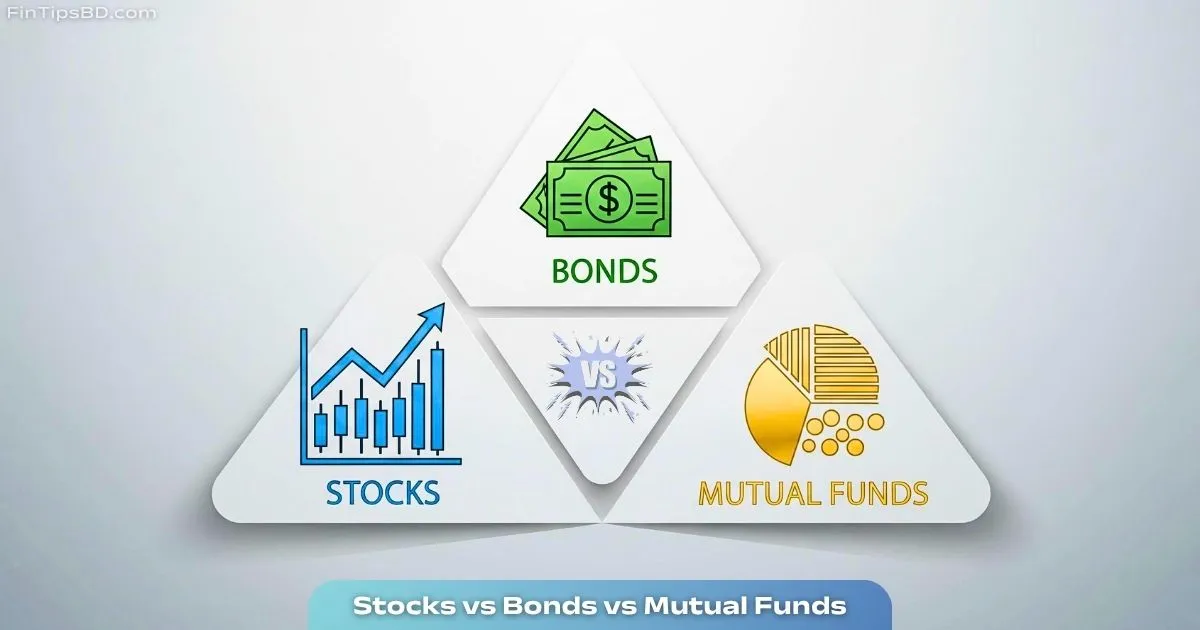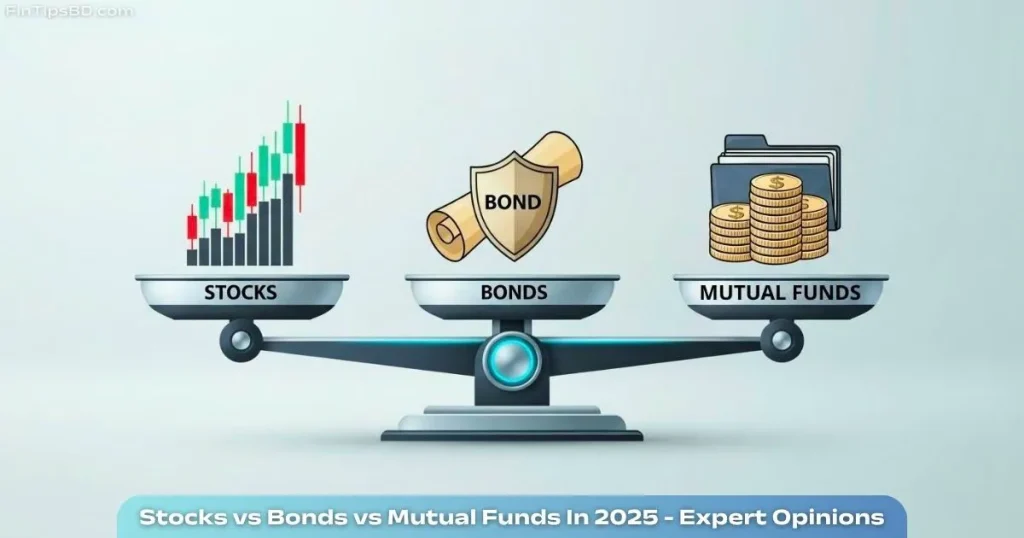Stocks vs Bonds vs Mutual Funds – Experts Reveal What Works in 2025

Stocks vs Bonds vs Mutual Funds — this long-standing debate still captures the attention of both beginner and experienced investors. In 2025, the question feels even more pressing. With markets changing quickly due to worldwide economic shifts, tech-driven growth, and concerns about inflation, picking the right investment route can greatly impact your financial well-being.
In this guide, we’ll break down where each investment option currently stands, include insights from experts, and help you figure out which choice fits your portfolio this year. If you’re unsure whether to put your money into stocks, bonds, or mutual funds in 2025, keep reading for a complete overview.
Table Of Contents
Getting the Basics Right: Stocks, Bonds, and Mutual Funds
Before jumping into the details for 2025, let’s first make sure we clearly understand these key investment types.
What Are Stocks?
Buying a stock means you’re taking partial ownership in a company. This gives you a share of the company’s profits and assets. Stocks offer a chance for big growth over time, which is why they’re appealing for long-term investing. But they also come with built-in risks and can drop sharply when the market takes a hit.
Main Points:
- High risk, high reward: Historically, stocks have offered the strongest growth potential.
- Best for long-term gains: Over time, the ups and downs tend to even out, making them ideal for big-picture financial plans.
- Publicly traded: Stocks are bought and sold on major stock exchanges.
- Sensitive to many factors: Company performance, global events, and news headlines can all affect their price.
What Are Bonds?
Bonds are debt instruments that act like loans from an investor to a company or government. In return, the borrower pays regular interest and gives back the original investment when the bond matures.
Main Points:
- Less risky than stocks: Bonds are usually more stable and fluctuate less, making them safer.
- Steady earnings: They provide regular interest payments, which appeals to income-focused investors.
- Good for preserving money: Bonds help safeguard your capital during market turbulence.
- Rates and credit matter: Bond prices tend to fall when interest rates rise, and their safety depends on the borrower’s credit score.
What Are Mutual Funds?
Mutual funds are pooled investments that collect money from many individuals to buy a mix of assets—like stocks, bonds, or both. Managed by professionals, they offer a hands-off way for investors to diversify without picking individual investments themselves.
Main Points:
- Wide-ranging diversification: By investing in multiple sectors or asset types, mutual funds help spread out the risk.
- Run by experts: Skilled fund managers handle all the decision-making for the investors.
- Active or passive styles: Some aim to beat the market, while others track an index.
- Many fund types available: You can choose from stock funds, bond funds, or blended (hybrid) funds depending on your comfort with risk and your goals.
Stocks vs Bonds vs Mutual Funds in 2025: Expert Opinions

As we head further into 2025, the investment world is being shaped by a unique mix of factors—persistent inflation, elevated interest rates, and fast-paced growth in tech industries. These shifts are having a real impact on how investors approach their strategies.
Expert Take on Stocks in 2025
Many market analysts are still positive about the outlook for stocks, especially in sectors such as technology, healthcare, and artificial intelligence (AI). Monica Patel, an equity analyst at ClearPoint Research, explains, “Investors who can handle a bit of market turbulence are getting solid returns from sectors like AI, robotics, and renewable energy. We anticipate above-average performance from select growth stocks this year.”
However, Patel also emphasizes that timing the market is never easy, and picking the right individual stocks requires solid research. For everyday investors who may not have the time or background for deep analysis, more diversified options like Exchange-Traded Funds (ETFs) or equity mutual funds are often a smarter choice.
What’s Going On With Bonds?
The bond market is making a noticeable comeback in 2025. After years of disappointingly low yields, the current environment—driven by rising interest rates—has made bonds a much more appealing option. George Carmichael, a fixed-income strategist at StableWealth Partners, notes, “For the first time in over ten years, bonds are delivering real, inflation-adjusted returns. Long-duration government bonds and high-quality corporate bonds are both showing strong potential.”
This renewed appeal is pulling in investors who are focused on reliable income or aiming for more portfolio stability. This includes retirees or those approaching retirement, who are increasingly turning back to bonds as a dependable investment.
How Mutual Funds Fit Into the Picture
Mutual funds continue to be a go-to choice for people who want well-rounded exposure without the stress of managing individual assets. Hybrid mutual funds, which combine both stocks and bonds, are especially gaining momentum because they offer a balanced approach to risk and return.
Carla James, senior portfolio manager at Horizon Capital, points out, “Mutual funds provide ease, diversification, and professional oversight. In 2025, hybrid funds and international equity funds are doing particularly well, giving investors a good middle ground between growth potential and safety.”
Head-to-Head: Stocks vs Bonds vs Mutual Funds
To help guide your decision, here’s a side-by-side breakdown comparing the three major investment types across key categories:
| Feature | Stocks | Bonds | Mutual Funds |
|---|---|---|---|
| Risk Level | High | Low to Moderate | Varies by fund |
| Return Potential | High | Moderate | Moderate to High |
| Liquidity | High | Medium to High | Medium |
| Management | Self-managed | Self-managed | Professionally managed |
| Best for | Long-term growth | Capital preservation | Diversified exposure |
Choosing the Right Investment in 2025

Deciding between stocks vs bonds vs mutual funds depends on your personal financial situation, how much risk you’re willing to take, and your investment timeline.
Go with Stocks if:
- You’re investing for the long haul (typically 5+ years).
- You’re okay with short-term dips in exchange for higher growth potential.
- You want to tap into fast-growing sectors like tech and artificial intelligence.
Go with Bonds if:
- You prefer a steady, predictable income stream.
- You’re close to retirement or already retired and want to protect your capital.
- You aim to reduce market swings and bring more balance to your portfolio.
Go with Mutual Funds if:
- You’re a beginner or prefer not to manage your investments directly.
- You appreciate expert guidance without doing deep research yourself.
- You want a blend of assets and built-in diversification without constant oversight.
Many financial professionals suggest having a mix of all three options. A diversified strategy helps you handle market ups and downs, while still aiming for growth and income over time.
Investment Trends to Watch in 2025
Several ongoing trends are shaping how people are thinking about stocks vs bonds vs mutual funds this year:
- More interest in ESG funds: People are increasingly looking to align their investments with personal values, focusing on environmental, social, and governance factors.
- Rise of theme-based investing: Technologies like AI, clean energy, and biotech are attracting more investor attention.
- Looking beyond home markets: Global diversification is gaining momentum, as investors seek out new opportunities overseas.
- Better bond returns: With higher interest rates, bonds are once again offering real value, drawing in more conservative investors.
Additionally, digital platforms and robo-advisors continue to make it easier to build a well-rounded portfolio, letting people combine stocks, bonds, and mutual funds with just a few clicks.
Final Thoughts: What’s the Best Choice in 2025?
When it comes to stocks vs bonds vs mutual funds in 2025, there’s no single answer that fits everyone. Each type has its own strengths:
- If your main goal is growth, and you can handle ups and downs, stocks may be your best bet.
- If you’re focused on stability and steady returns, bonds are now more appealing than they’ve been in years.
- If you want diversification with expert management, mutual funds provide a smart, balanced solution.
No matter which direction you take, it’s wise to review your strategy regularly and make adjustments as the market shifts. Staying flexible and informed will help you make better financial decisions and reach your goals over time.
Keywords: investment options 2025, best investments 2025, stock market vs bonds, mutual fund investment, stock vs mutual fund, bonds vs mutual funds, stocks vs mutual funds vs ETFs, beginner investing 2025, portfolio diversification, investing trends 2025
